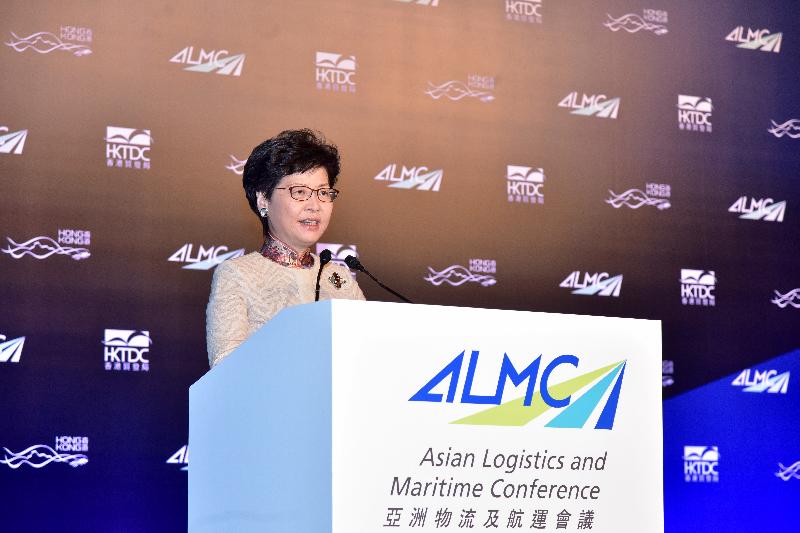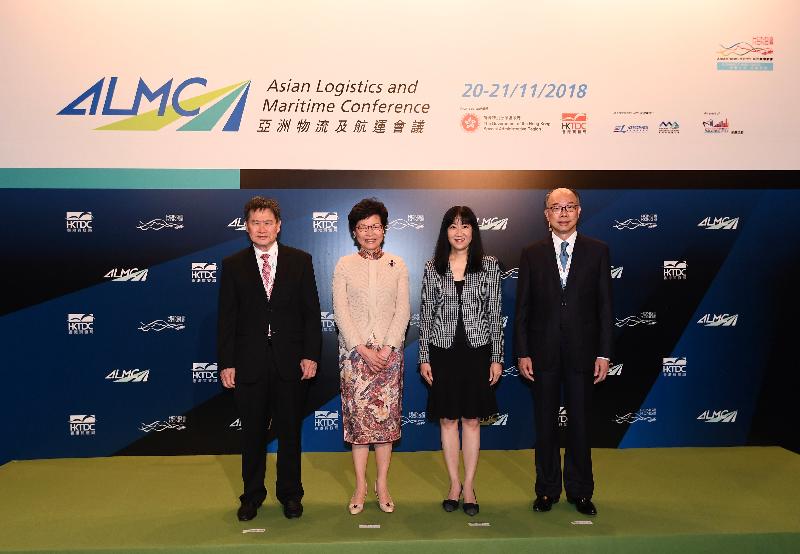Speech by CE at Asian Logistics and Maritime Conference (English only) (with photos/video)
******************************************************************************************
Secretary-General Dato' Lim (Secretary-General of the Association of Southeast Asian Nations (ASEAN), Dato' Lim Jock Hoi), Lord Mountevans (Vice Chairman of Maritime UK and Chairman of Maritime London), Margaret (Executive Director of the Hong Kong Trade Development Council, Ms Margaret Fong), ladies and gentlemen,
Good morning. It's a pleasure to be here for the opening of the 2018 Asian Logistics and Maritime Conference. It is, I'm pleased to say, the fourth year in a row I've spoken at this conference. I am always keen to come not only because you represent one of Hong Kong's and the world's most vital sectors, but also because there is always a good turnout. This year, more than 2 000 high-profile logistics users and providers from over 30 countries and regions have joined us. I welcome you all to Hong Kong, one of the world's preeminent logistics and maritime centres.
In the global business of logistics, connections are critical. The more connections your logistics sector has, the more complex and interrelated they are, the more effective it will be. In that regard, Hong Kong is truly blessed. Thanks to "one country, two systems", we enjoy ever deeper transport and logistics connections to Mainland China and to the opportunities therein. Thanks to that same system, we also continue to build our ties with the world.
Together, those singular connections make Hong Kong excel in the global business of logistics. They make our partners excel, too. Consider this morning's keynote speaker, the Secretary-General of the Association of Southeast Asian Nations. ASEAN, as a group, is our second-largest trading partner. We signed a free trade agreement and related investment agreement one year ago this month, which will begin to take effect in January next year and will surely boost our trade, our investment and our overall connectivity. I am sure the Secretary-General will agree with me when I say that relations between ASEAN and Hong Kong have never been better, never more promising than they are now.
The agreements show that Hong Kong and the 10 member states of ASEAN believe in free trade, and in the mutual rewards trade and logistics can bring to our economies, our companies and our peoples. As we all know, free trade is taking something of a thrashing these days, given the rising undercurrent of unilateralism and protectionism. Let me assure you, ladies and gentlemen, that for Hong Kong, the primacy of free trade is immutable. I am pleased to say that we have successfully concluded free trade agreement negotiations with Australia just a few days ago.
It's thanks to free enterprise and our ability to adapt to the changing market that has made Hong Kong one of the world's leading trading economies, and a leading international financial and logistics centre. Indeed, trading and logistics is one of our four pillar industries. It contributes 22 per cent of our GDP and accounts for some 19 per cent of Hong Kong's total employment. Our trade value amounts to more than three times our GDP, standing today at about US$1,060 billion.
Hong Kong's local market may be modest, but our ability to serve and create markets, to trade in goods and services with the world, is inexhaustible. For that, we can thank our formidable foundation for international trade. I'm talking about world-class infrastructure, superb connectivity, an unbeatable location at the heart of Asia and the gateway to the Mainland. I'm talking about our institutional strengths, as well as an abundance of talent in a wide range of professional services and business sectors.
Our foundation is buoyed by our expanding investment in infrastructure and transport networks. These connect Hong Kong with hundreds of destinations throughout Asia and around the world. Hong Kong today is home to one of the world's busiest transshipment container ports. Serving about 320 liner ships a week, it's linked to more than 470 ports worldwide. Last year, Hong Kong Port's throughput stood at 20.8 million TEUs which accounts for 4 per cent of the throughput of Asia, up 5 per cent over the previous year. Our Shipping Register is the world's fourth largest, with a gross tonnage of more than 120 million. In short, we will continue to be a key maritime player in the Asian region.
We are a force to be reckoned with in the air as well. Our airport has been the world's busiest in international air cargo for the past 22 years in a row, serving an ever-growing demand for high-value logistics in the Asia-Pacific region. Hong Kong enjoys Air Services Agreements with 67 countries. Our airport handles more than 1 100 flights daily to over 220 destinations, including some 50 Mainland destinations. Last year, we moved 5 million tonnes of cargo and air mail, and handled 73 million international passengers.
To enhance capacity, we are building the third runway for our airport. Upon completion, the Hong Kong International Airport will be capable of handling 100 million passengers and 9 million tonnes of cargo annually. The third runway will be in operation by the end of 2022, while the entire three-runway system, including all upgraded facilities, is expected to commission by the end of 2024.
The Hong Kong International Airport is located on Lantau, our biggest island which is now serving as a double gateway. Apart from connecting Hong Kong to the world through our airport, Lantau is also linking Hong Kong to other cities in the Guangdong-Hong Kong-Macao Greater Bay Area, which comprises Hong Kong, Macao and nine affluent cities in the Guangdong Province. Together, the Greater Bay Area has a population of 70 million and a combined GDP of US$1.5 trillion.
Enhancing connectivity between Hong Kong and the Greater Bay Area is a central policy commitment of my Government. The recent commissioning of the mega Hong Kong-Zhuhai-Macao Bridge has given us a huge boost. The world's longest combined sub-sea tunnel and bridge, a piece of world-class infrastructure, it has sharply cut travel time to the Mainland cities on the Pearl River's west bank. For example, thanks to the new bridge, the journey between Hong Kong International Airport and Zhuhai, one of southern China's fastest-growing cities, has been reduced from four hours to just 45 minutes. This will surely attract time-sensitive, high-value goods to the bridge and, from there, to the rest of the world through Hong Kong International Airport. Let me add that the time needed to travel from Zhuhai to our container port in Kwai Chung is also reduced from 3.5 hours to 75 minutes.
Last month, my Government unveiled long-term plans to reinforce the role of Lantau. Among the planned developments is a Premium Logistics Centre, with a built-up space of some 380 000 square metres which will allow us to capture the opportunities presented by the fast-emerging retail revolution. The Centre, relying on robotics and automation, will be able to process 1.7 million tonnes of cargo a year when it opens in 2023.
Challenges generally come hand in hand with opportunity. Today, developed economies, Hong Kong included, must contend with long-term labour shortages, a reflection of our ageing population. And then there's e-commerce, its continuing growth fuelling an insatiable demand for faster and faster small-parcel shipments.
Automation and AI (artificial intelligence) can meet these challenges. Indeed, robotics, automated ports and blockchain technology are transforming logistics, increasing handling capacity and expanding efficiency. Every one of us in the logistics industry in general must embrace these innovations.
Innovative technology without innovative talent will surely fail to deliver on its outsized promise. That's why, in 2014, we set up the Maritime and Aviation Training Fund. It offers a wide variety of training schemes, providing scholarships and other initiatives to boost talent intake in both sectors. More than 6 200 students and industry practitioners have benefitted from the Fund to date. To sustain the momentum, I announced in my Policy Address last month that the fund would receive an additional US$25 million.
Our logistics connectivity extends to the industry services on offer. Hong Kong's 800 shipping-related companies present a flotilla of maritime services. They include ship agency and management, broking and chartering, finance, marine insurance, and maritime legal and arbitration services. Many of the world's logistics giants call Hong Kong home. They are joined by over 8 700 Mainland and overseas companies from various sectors which have established a presence in Hong Kong, among them over 1 500 are regional headquarters and some 2 400 are regional offices.
The world is here because Hong Kong is Asia's most connected city - the multilateral, multilayered business bridge linking Mainland and global opportunity. The logistics and maritime sector, like every other sector, industry and business, looks to Hong Kong to build a rewarding future. I encourage all of you to join us, to connect and excel right here in Asia's world city.
Ladies and gentlemen, I wish you the best of business at the Asian Logistics and Maritime Conference. And my thanks to the Hong Kong Trade Development Council for organising this year's Conference, for once again demonstrating logistical excellence in action. Thank you very much.
Ends/Tuesday, November 20, 2018
Issued at HKT 11:00
Issued at HKT 11:00
NNNN




